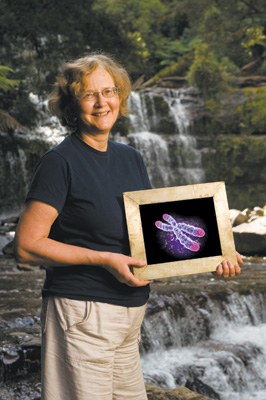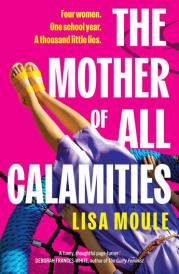Sonya Pemberton Secrets of the Human Body Immortal Interview

Sonya Pemberton Secrets of the Human Body: Immortal Interview
Can it be true? Have scientists really discovered the secret to endless youth? Noble Prize-winning Australian scientist Professor Elizabeth Blackburn says the answer is yes.Her story is told in Immortal, an astonishing science documentary screening on SBS as part of its Secrets of the Human Body season.
Through Professor Blackburn's work, science now knows the power of the enzyme telomerase, a chemical which can keep cells young - forever. But there's a catch: the same enzyme that fuels life, also fuels cancer.
Immortal chronicles the discovery of this remarkable biological paradox - a discovery that began in the late 1970s when Professor Blackburn determined the structure of "telomeres" - specialised regions at the end of every person's DNA, protecting the rest of the strand from damage.
In 1984, while investigating a single-celled pond creature, Blackburn discovered an enzyme - she named it "telomerase" - that could add new DNA to telomeres, replacing the DNA that naturally disappeared every time a cell divided.
Amazingly, cells with high levels of telomerase can keep reproducing and never grow old. They are, in effect, immortal. And in 2009, Professor Blackburn's team was awarded the Nobel Prize for this discovery.
Sonya Pemberton, award-winning writer/director of Immortal, spent five years delving into the discovery of telomerase and its ramifications for human kind. With the help of Professor Blackburn, other Nobel Prize winners and ageing experts, she chronicles how telomerase can slow down ageing and in some cases, even stop it.
But what of telomerase's dark side?
Cancer cells have hyperactive levels of telomerase. They have the ability to replicate endlessly, ignoring instructions to die. And so, the key to endless life is also the key to cancer's deadly success.
Not sure of what to make of this paradox? Ultimately, Immortal is an uplifting film, showing you what steps to take, right now, to protect your precious telomeres. And while you do that, brilliant minds across the globe are busy harnessing the power of telomerase. Not to make you live forever, but to help you live better, for longer.
Secrets of the Human Body: Immortal
Sunday 5th of December, 2010
8:30pm
SBS One
Interview with Sonya Pemberton
Question: Why did you want to share Professor Elizabeth Blackburn's research and story with Australia?Sonya Pemberton: About five years ago I discovered the story of a woman born in Tasmania, an Australian scientist who moved to America who discovered the immortalising enzyme. I thought this story sounded too extraordinary to be true. I wanted to find out more about the story and I quickly discovered that Professor Elizabeth Blackburn is one of the superstars of international science and yet, very few people in Australia really knew who she was. Professor Elizabeth Blackburn had done this remarkable thing of not only first working out how our cells counts down death but she had also discovered how to stop them.
Question: How did you go about meeting with Professor Elizabeth Blackburn for the documentary?
Sonya Pemberton: Professor Elizabeth Blackburn is a very humble superstar of science and she is seen like a 'rockstar' in the science community - she'll get mobbed when she goes to lectures, she receives an awful lot of attention. She doesn't enjoy media attention or publicity, she is very quiet, hardworking and extremely smart; the last thing she wants is to receive more attention, to herself. When I wanted to make a film that was about Professor Elizabeth Blackburn's work, she wasn't interested in anymore publicity.
Question: How were you able to persuade Professor Elizabeth Blackburn to participate in the project?
Sonya Pemberton: I had to call on some favours from some people I knew she'd be meeting with. It's more that she doesn't have the time, in her very busy life and she doesn't see the media as particularly important, which I find refreshing in this world were most people want lots of media. It took a mutual colleague, putting in a good word for me, for her to agree to meet with me. Rather than agree to meet with me to make the film, Professor Elizabeth Blackburn agreed to meet with me so she could interview me. I have never been in the position where someone has interviewed me for a project; it's normally the other way round (laughing). At the end of that process she decided that she was prepared to get involved. The reasoning behind the project, I think, is because science is complicated I think it is useful to have a film that tells it, correctly and simply.
When making the film we put a lot of effort into making it accessible and enjoyable. The film is quite high energy and deliberately not being a lecture, I wanted this film to be as accurate and simple as possible. Professor Elizabeth Blackburn has said that she is very pleased with the film and we have had a lot of scientific feedback too. It is quite difficult, if you over simplify it you get it wrong; you have to embrace complexity as some science is complex and you have to take that on. If you understand the science well enough, you can filter it and translate it, to the screen in a way that, hopefully, a general audience will understand and enjoy.
Question: How was Australia not aware of Professor Elizabeth Blackburn's research, it seems so significant?
Sonya Pemberton: It is remarkable! I assumed that if I dug a bit deeper I would find that everybody knew about whom Professor Elizabeth Blackburn was and what she had done and it quickly became apparent that, that was incorrect. There are two reasons: one, probably because she had moved to America, twenty years ago and most of her work and research had been conducted in America, which is why we don't hear a great deal of her here, in Australia. In American Professor Elizabeth Blackburn is very well known, in the scientific circles, but again, she is not someone who seeks publicity. Two: also, because the science is actually molecular biology, it sounds a little bit boring. The media often go too far the other way and say this is the secret to endless life and Professor Elizabeth Blackburn is not happy with either extreme, which is quiet rightly so, it is too simplistic. The amazing paradox with Professor Elizabeth Blackburn is that she had discovered the same thing that fuels the life of our cells also fuels the life of our cancer cells.
Question: Can you talk about how the same thing that fuels the life of our cells also fuels the life of our cancer cells?
Sonya Pemberton: It is quite complicated biology; I recommend that you watch the show to understand the full complexities. Basically, inside every one of our 100 trillion cells, of the body, is our DNA at the ends of the strands of DNA are these little caps on the tips; if you imagine them like a pair of shoelaces, these little shoelace caps are called 'telomeres'. The telomeres count down, with every cell replication; every year you get a little bit older and your cells (skin cells, hair cells, a lot of your organ cells) have to reproduce to keep you fit, strong and healthy. As you get older, the cell replication, slows down which is why we get wrinkles, sun spots and grey hair- this is about 80% of the ageing process. These telomeres count down as you get older, the younger you are the longer they are, the older you get the shorter they get until they get so short that they malfunction and the cell dies. For example, when the hair cells die your brown hair will no longer be able to grow, it will grow grey because the cells that control colour, have gone.
Professor Elizabeth Blackburn discovered the enzyme, a chemical, a catalyst - you add that to DNA and it keeps the telomerase long or in some cases re-grows them, it can take old cells and make them young again, it really is remarkable! When you first hear about this, the skeptic in all of us goes 'no, this can't possibly be true, it's too good', It turns out that if you believe in Mother Nature there is a counterbalance for this because it's not as simple as adding more of this enzyme, called 'telomerase' and if you just add more of this enzyme this seems to fuel cancer. It doesn't cause cancer, but if cancer cells were already there, it gives them the fuel that they need to take off. If you imagine that a cancer cell is like a car that someone has tampered with the breaks and the car is running down the hill, with no breaks, to stop it and then you give it extra fuel and jam the accelerator down- it increases it; the telomerase doesn't cut the breaks or jam the accelerator but gives it fuel, so it never stops. Likewise telomerase gives healthy cells fuel to keep growing and going- but if we just add more telomerase, which scientists are experimenting with, there is this risk that you will accelerate any cancers that are there dormant. Most of us have about 200 cancer cells in our body at any given day and most of them get dealt with by our very efficient immune systems. You have to assume that all of us, at some point, have cancer cells in our body and the trick is to keep healthy, fit and strong to keep them all under control and to help our body be as strong as possible to not keel over when it gets hit with a cancer cell.
Where the science is at, at the moment, is walking a tightrope trying to work out the ying and yang of this so you receive enough telomerase to keep healthy cells growing and reproducing but not so much that they get into the cancer cells and fuel cancer growth.
Question: How long did it take to make this movie?
Sonya Pemberton: Five years, from the first idea, raising the finance took a number of years. The actual film making took, over 18 months.
Question: What effect did the film and research have on your life?
Sonya Pemberton: I decided to have my telomeres tested; it's not a common test, yet. One of the scientists offered the three crew members the opportunity to have ours tested, two of us said yes, one of us said no- that is pretty average because about two-thirds of people are interested, when given the choice. I decided to do the test because I had to accept that the science was new and by no means definitive, I would say it is five years away from really being useful for your average person, because there is not a big enough database for comparison. If you and I went to have a cholesterol test, or blood pressure test, there are millions of people who have been tested to where normal is; for telomeres there has only been thousands tested, which means the sample group is not quite big enough, yet. The second reason I went ahead with the test was the recent discovery, in the last two or three years, that these telomeres are malleable and can move, they just get smaller with time. Professor Elizabeth Blackburn, in the film, calls it 'the fuse that counts down' or a candle that is burning down, with time. We now know that you can influence how fast the candle burns. Once I knew it was malleable and I could affect it, I decided that if mine wasn't particularly good, at least there was something I could do.
I had my telomeres tested and I tracked with somebody about five years older, than I am, which was a shock. It is quite complicated but basically if the normal for my range is 8.5 there is a bandwidth of plus or minus 2 so 6.5-10.5 is normal, which is a broad bandwidth. Mine was 8. 6.5 is the bottom of normal and 8.5 is top of normal. I wasn't happy and I wanted to change my results.
Question: What did you do to change your telomeres result?
Sonya Pemberton: The lessons that I took away from making the film was stress is important- stress looks like it probably wears down your telomeres faster. A whole third of the film is devoted to looking at stress and how stress affects these important ticking clocks. People who have very stressful lives have been shown to age ten - seventeen years more than someone who isn't chronically stressed; which also means that those who are chronically stressed are far more susceptible to disease.
One of the two biggest findings in the last couple of years were that stress could cause ten - seventeen years more ageing in your cells and there was a direct relationship to your risk for heart disease, lung disease and cancers.
I took three months holiday; I put a hold on all my work after I finished Immortal. I decided that I would take three months travel and I wouldn't go on a plane because I spend my whole life on planes. My husband and I decided to go camping and I took it very easy for three months. I also changed my diet and my exercise. In fact, I have already done my big 15 kilometer walk for today. I lost about 8 kilograms, which is what I needed to do, I wasn't terribly overweight, but that was enough for me to say 'I am back down to the size that I want to be'. I am much fitter and stronger than I was 18 months ago and I really have worked hard at reducing the stress factors in my life. I am hoping to have my telomeres tested again in a couple of months.
The lesson for people who are interested in this is: watch the film because it can help explain what happens with our DNA. What is so amazing is that for the first time, in history, we can see how well we are ageing, in our DNA and we can measure it, harness it and now in some ways we can reverse it.
A section of the film explores a little pill that has come out that is supposed to do it all with the pill- it is controversial and we talk about the pill which is based on a Chinese herb. In Immortal we also talk to some people who have reversed their cellular ageing at quite a dramatic level and you are able to hear their successful stories. The film also looks quite hard at what this is going to mean down the track and the future, of slowing down the ageing process.
The key message of the film is: it's not about becoming immortal human beings but about our immortal self and as we age our cells age and we age. If you can slow down the ageing of the cells you can slow down your own ageing process. The fact that you can do it naturally, is a great wake-up call for us all, it definitely was a wake-up call for me.
Within the next couple of years the telomeres test will become more readably available - especially as companies are starting up, all over the world, now. There is a lot of information on the internet, that is not terribly accurate and people need to be a little bit caution of people who are trying to sell very, very expensive regimes. At this stage I would say that the healthy and natural options seem to be the best way forward, with what we know at the moment, in saying that, this could all change in the next five years.
Interview by Brooke Hunter
MORE



